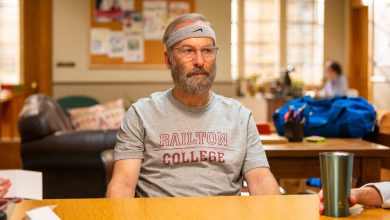With ‘Lucy and Desi,’ Amy Poehler Gets to the Heart of a Marriage

Near the beginning of the new Amy Poehler-directed documentary, “Lucy and Desi,” an audio recording plays. In it, Lucille Ball thanks her husband, Desi Arnaz, for her two beautiful, healthy children. That’s not exactly a shocking statement coming from a woman in 1950s America. What’s surprising is that Ball finishes by thanking her husband for her “freedom.” It’s one of many moments in the film that might cause those who think they know the story of these stars, and this couple, to lean in a little closer.
For Poehler, also an actor and comedian whose professional and personal lives are subjected to the occasional tabloid treatment, Ball’s striking admission was one of many revelations that inspired her to look deeper into the relationship of one of Hollywood’s most recognizable couples. Partly because of the enduring popularity of “I Love Lucy,” Ball and Arnaz, who played the married Lucy and Ricky Ricardo, came to represent a particular brand of loving, married couple for generations of audiences. Like many marriages, though, their partnership was far from perfect.
When Poehler was approached by the production companies Imagine Entertainment and White Horse Pictures about making a documentary about Ball and Arnaz, she knew she didn’t want to make a film where “funny people talk about how funny everyone is” but instead to speak to people who actually knew one or both of them — like their children, Lucie Arnaz and Desi Arnaz Jr., or Carol Burnett or Bette Midler. Poehler didn’t want to portray Ball as a genius, but as a very real woman whose 20-year marriage was at once complex, loving, painful and tender.
During a recent phone call while she was walking through New York, Poehler discussed the ways Ball and Arnaz broke barriers, shaped culture and proved that a marriage doesn’t have to be last forever to be successful. These are edited excerpts from our conversation.
When Lucy thanks her husband for her children and her “freedom,” it’s striking. What was your reaction when you heard that?
What to Know About ‘Being the Ricardos’
The Aaron Sorkin-directed dramedy looks at one very bad week for Lucille Ball and Desi Arnaz, played by Nicole Kidman and Javier Bardem.
- Review: The not-so-funny side of the “I Love Lucy” stars is the focus of Sorkin’s lively, chatty, somewhat odd and insistently depoliticized biopic.
- ‘Funny’s Hard’: Nicole Kidman said that comedies do not come easily to her. Here’s how she learned to love playing Lucille Ball.
- Remembering Lucille: How does Nicole Kidman’s Lucy compare to the real Lucille Ball? A writer recalls his first disorienting meeting with the comedian.
- Best-Picture Race: Our columnist thinks “Being the Ricardos” is among six contenders with the strongest chances to win the Oscar.
I didn’t expect that word. I don’t know exactly what she meant, but I like to think she meant she was able to have financial freedom. A woman over 40 and a Cuban American immigrant and refugee were not often the people in the room when the deals happened, and so for her, financial freedom was huge. She grew up with scarcity, and Desi had a privileged life in Cuba and went through a traumatic experience of losing everything and having to escape his own country. So they both cared about work and providing for their family. I think that freedom came from a kind of security. I also think they loved each other for who they were.
Did you have any reservations about taking on the project?
I was trying to figure out, as a filmmaker, what would be my way in and my point of view. I do find that with people this famous and accomplished, you hear words like “pioneer” or “genius” a lot and it’s like … OK. There have been so many tributes already. I was excited when I talked to White Horse and Imagine, and I basically said there are a couple of things I want to try to avoid. One was to spend the whole movie having funny people talk about how funny everyone is. I wanted to try to bring them back down to earth. Then I figured out that the love story is really the thing that, hopefully, keeps people watching.
The footage and tapes you had access to were so intimate, and many had never been seen or heard by the public. How much archival audio did you have access to?
It was hours and hours of stuff. One of our producers was at [Ball’s daughter] Lucie’s house, and she pointed to a box, like, “What’s in that one?” It was very much a genie-in-the-bottle moment, finding all these audiotapes. When you’re doing a documentary, you realize that you and your editor [Robert Martinez, whose credits include “The Bee Gees: How Can You Mend a Broken Heart”] are like two people on a life raft. There was so much material, and that was by far the most overwhelming thing. Once we made the decision to hear Lucy and Desi tell us their story [via the recordings], everything changed, because not only did it make them feel alive and human, but we were able to age them as the film went on. Even though I strongly believe that most people are unreliable narrators, I think you learn a lot from what people don’t say, and it’s just as important as what they do say. I was always very moved by how they spoke about each other.
The film gives you the sense that on one hand, they’re upholding this very 1950s version of happily ever after, but that off camera, at least later in the marriage, they struggled. It’s sometimes hard to reconcile that with the Lucy and Ricky we see on television.
Television is an intimate medium that you often watch with your family, and they were the early inventors of the idea of rupture and repair, which is, maybe Lucy baked too much bread or Ricky forgot her birthday or whatever it is, and you think there’s no way they’re going to fix it, and they fix it at the end and everything’s fine. There’s a deep longing, especially in postwar America at the time, of thinking: “Can things be fixed? Are we going to be OK? Is the family going to stay together?” And what was really exciting to me is they were experiencing very human, complicated things that most people feel with success and marriage. You know, all the things that happen in a human life.
Did you have discussions with the producers or your editor about their marriage or about why their relationship might resonate with modern audiences?
Yeah, we really tried to deconstruct the idea of a partnership and ask questions about what makes a successful marriage. What Lucy and Desi do in their lives is they work very hard on themselves and their craft. They create this beautiful music together. And they go on to continue to create separately, respecting each other and finding ways to work together. So there’s always that question of, what is a successful partnership? Their marriage ends, but they co-parent and find new love. I loved talking to Laura LaPlaca [director of the Carl Reiner Department of Archives and Preservation at the National Comedy Center] because she said that America just didn’t accept their divorce. America was just like, nope. But they showed what it was like to get divorced and show respect for each other. They were blazing a trail. You know, if I had had the privilege to speak to either one of them, they probably would have just been living their human, complicated lives. They weren’t trying to do any of that.
Desi passed away in 1986. Their daughter Lucie tells a moving story about bringing them together to watch old episodes of “I Love Lucy,” which, in a way, is a little bit of a happily ever after, but very bittersweet. What did that story mean for you, and what do you think it says about their marriage and that notion of happily ever after?
Lucy said that after they divorced, they became a lot kinder to each other. As a culture, we’re obsessed with “till death do you part.” But don’t you want the goal to be that on your death bed, you can tell people you love them? Is the goal to have an unhappy, decades-long marriage, or is the goal to come together in partnership to create interesting stuff together and to stay full of love and respect for each other? Lucy and Desi worked really hard, and when given the opportunity, they held hands and they jumped. It just feels like they were astronauts.





